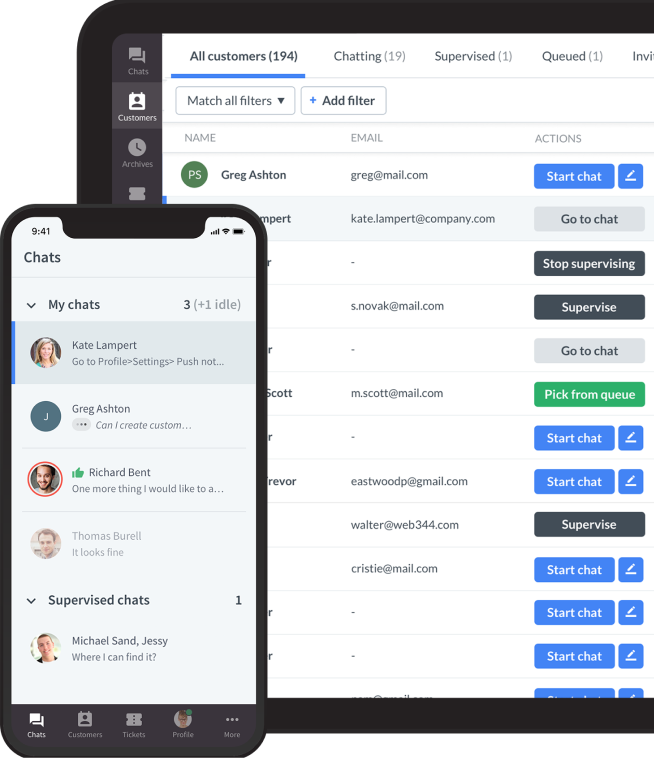Showing top 0 results 0 results found
Showing top 0 results 0 results found

At LiveChat, we work with customers and legal documents on a daily basis.
One of the most important lessons we’ve learned is that it’s easy to get lost with all of these types of documents and demands from our customers.
This article will explain what legal documents are the most common for IT businesses, how to choose what documents your business needs, and what documents we can provide to help you.
The most common documents for IT businesses
You may already know that there are many documents that are treated as a standard for the IT business. There is also a pretty extensive field of additional documents that are nice to have.
To select what you should have, let’s start with a basic list of agreements, policies, and documents you may consider helpful, along with a short explanation.
Terms of Service or Terms and Conditions
This is the main agreement between customers and the company. It provides the main overview of the relationship between those parties. Usually, you can find it on the company’s webpage.
You can view LiveChat Terms of Use here.
Privacy Policy
This is the policy, usually attached to the Terms and Conditions, where you can find information about privacy and the processing of data. It should tell you what data is being collected and how the company processes it. Need some inspiration?
Make sure to check out our Privacy Policy.
Security
This is a policy that shows what measures are used to protect privacy. Remember that this policy is broader than just being about access to personal data. It presents an overview of how your system deals with safety.
Take a look at LiveChat security and data storage document.
Data storage and hosting policy
This is a policy referring to storage issues. We use it to show our customers how we manage storage centers, where we keep different types of data, and what the possible storage options are.
Interested in a quick overview of this topic? Go to our data storage and hosting policy.
Partner Program Terms and Developers Terms
Both of these documents are for more specialized interests. As you can see, both are available online to the public, but not every customer we have has the need for these types of documents. The first one is for our business partners who help us to grow our customer base. The latter one is made especially for developers who, for example, integrate our tool with other apps.
Data Processing Agreement or Addendum
This is a document that regulates the processing of personal data by processors. If you’re in the EU, you should sign it with every tool you use, and if you wish to sign it with us, feel free to let us know.
California Privacy Processing Addendum
This document is dedicated to a similar area as the above DPA. What’s different about it is that it is dedicated to Californian jurisdiction and regulates the processing of personal information in line with the California Consumer Privacy Act. We can sign this with our customers as well.
Service Level Agreement
This is a document establishing a minimum standard for service reliability. It should state estimated up-time and data recovery priorities.
HIPAA Business Associate Agreement (BAA)
This shows compliance with the US Health Insurance Portability and Accountability Act.
Is there a must-have standard when it comes to documents?
Let me start with the favorite answer of every lawyer: it depends.
There is no ultimate set of documents you should have or sign with your partners. Legal documentation is all about standards, ensuring transparency, and accountability. If you run any business, especially online, you should be interested in terms of service, privacy policy, and security.
That is the bottom line that shows the most basic elements like:
- What you do for the customer, from where, and what the core relationship between you and the customer is.
- How you treat privacy in that relationship.
- How you facilitate safety regarding privacy.
Furthermore, you should ask yourself what segments of customers or business partners do you have? It’ll help you to determine what other documents you may need.
- If you have any business partners or resellers, you should consider having either a separate agreement signed with them or use a similar form as we do. For us, it’s published on our webpage.
- If you deliver your products or service for customers from different countries, you should be current with their legal requirements. In Europe, you’ll need to be GDPR compliant and be aware of other documents like Data Processing Agreements or Standard Contractual Clauses. In the US, you’ll encounter questions about the California Privacy Act mentioned above, federal and state laws, and the HIPA.
- If you deliver your products or service for bigger companies, you may need to explore their needs. Be ready to face questions about Service Level Agreements, Product Orders, and additional compliance requirements or audits.
How can you create your first version of legal documents?
Legal documents have consequences. Good and reliable agreements and policies show that your company is transparent and that your customers have a reason to believe in what you offer. It’s easy to get lost in the complexity of preparing legal documentation.
To make it easier for you, I’ve prepared a short list of best practices for the first version of your documents:
- Keep it simple. Making your documents more complex than they need to be is tempting when it comes to agreements. However, remember that when you create a document that is understandable and transparent, you will make your customers feel safe when signing those documents.
- Keep it coherent. Avoid using different terms and names to describe the same things. Use language that is accurate and shows exactly what you mean. Use the same wording to describe the same things across your agreements and policies.
- Listen to your customers. Feedback from your customers is valuable. Ask your customers what policies or documents they need.






Comments